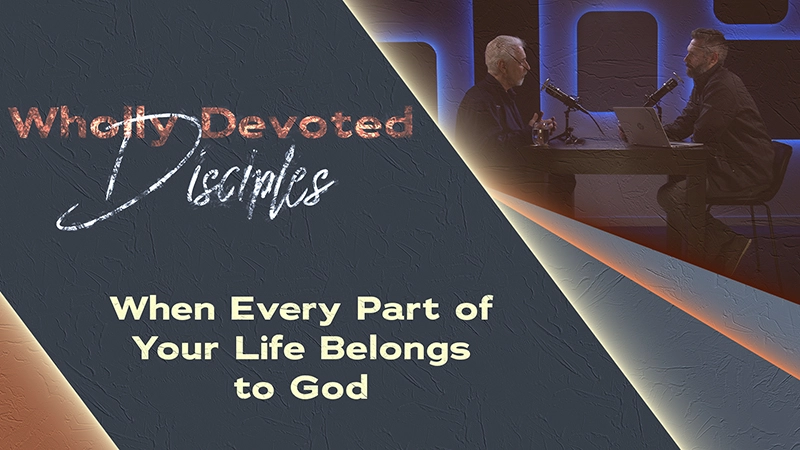
Timeless Truths: Satan is Fine with Morality, but Hates God's Authority
Timeless Truths: Satan doesn't really care if people live moral lives, as long as they never truly give their allegiance to God. This is why we must allow God to lead us into repentance from the rebellion that is in all of us.
Host: Steve, we want to finish up a discussion that we began last week on your book, Intoxicated with Babylon about your chapter titled, “The Spirit of Antichrist.” Last week we spent most of our time talking not so much about who the Antichrist is going to be, but rather the power that is going to be behind him. The spirit that is going to be so prevalent and growing in the last days. A spirit that you defined as a spirit of lawlessness.
{{blog-bbaby="/blog-ads-storage"}}
We finished our discussion last week talking about how the spirit of lawlessness is manifesting itself in the Church and you have a quote in this chapter from Oswald Chambers that I want to read. He wrote, “The Bible looks on sin not as a disease, but as red-handed rebellion against the domination of the creator. The essence of sin is ‘I won't allow anybody to boss me, saving myself,’ and it may manifest itself in a morally good man as well as in a morally bad man. Sin has not to do with the morality or immorality, it has to do with my claim to my right to myself, a deliberate and emphatic independence of God, though I veneer it over with Christian phraseology.” And the reason I bring that up is because we can actually be in the spirit that we're talking about and yet have all the outward trappings of a Christian.
Steve: Oswald Chambers really put his finger right on the core of sin when he wrote this little thing here, because what he's bringing out is the fact that sin has much more to do with our relationship to God's authority than it does with morality. And you know, a superficial church will constantly parade the big sins. The things people consider as the bad sins. Homosexuality, abortion, fornication and child molestation. We love to focus on those things because since we can say, “I don't do those things,” it's so much easier to point the finger at other people in order to feel good about ourselves spiritually. But there is a greater reality of how God looks at sin that Romans 2 brings out. It reveals that we may not be doing those terrible sins others are doing, but our hearts are still just as rebellious as those other people are. And that's the part that people often do not want to face.
Host: Well, we see that in Jesus's interaction with many people. He was very compassionate and very willing to forgive the person caught in adultery, but He was very strong with those who were locked in the bondage of self-righteousness and unwilling to admit what was wrong in their heart.
Steve: Yeah. He was much stronger with those who thought of themselves as “the morally good people” than He was with the publicans and sinners.
Host: Steve, you said that there will be a sign that this evil and this spirit that we're talking about has reached its peak. What was that sign?
Steve: Well, I said the final stage of lawlessness is a stubborn refusal to repent. I expect to see that in the world but what is frightening to me is how pervasive that mentality is within the Church. We have either rationalized our behavior away because we have been emotionally deprived in some manner, or we have just completely skirted taking responsibility for what's really going on in our hearts. One way or another, people have found a way to get out of acknowledging responsibility for their sin and you hardly ever hear preachers passionately calling on people to repent anymore. That's the thing that frightens me and that is what's paving the way for the great apostasy that's headed our way.
Host: Well, you said many of those who claim to be His followers don't know what real repentance is, which may be why they're not talking about it. And you say they don't know what it is because they've never really done it.
Steve: And many of them have never done it because they've never been led to do it because their pastors have never really lived in repentance themselves.
Host: Well, certainly, Steve, as you wrote, as the enemy’s activity increases in the days ahead, we need to be very sure as Christians that our conversion is a true conversion. And of course, we could talk for hours about that but just maybe as we close today, help folks to understand what is the evidence of a true conversion.
Steve: Well, in the chapter, I used an example from the Old. It was something that one of the Israelite kings said to another king who was coming in to invade. He just wanted to surrender to this king, and he said, “Just as you say, my lord the King. I and all I have are yours.” (1 Kings 20:4b, NIV) That represents true repentance and that represents a true conversion. Complete surrender to a conquering king. That's conversion.
Too often, people look at conversion as just an alteration of their lifestyle to fit Christianity into it, but true conversion means that their kingdom has been overthrown by a new king. Something is completely different and their attitude is that they have gone from being the king of their own life to Jesus Christ being the king in a very real and practical way in their daily lives. That's what a true conversion looks like.
Host: And He is a wonderful king. And it is a wonderful freedom and joy to know Him and to give up our lives for Him.

















